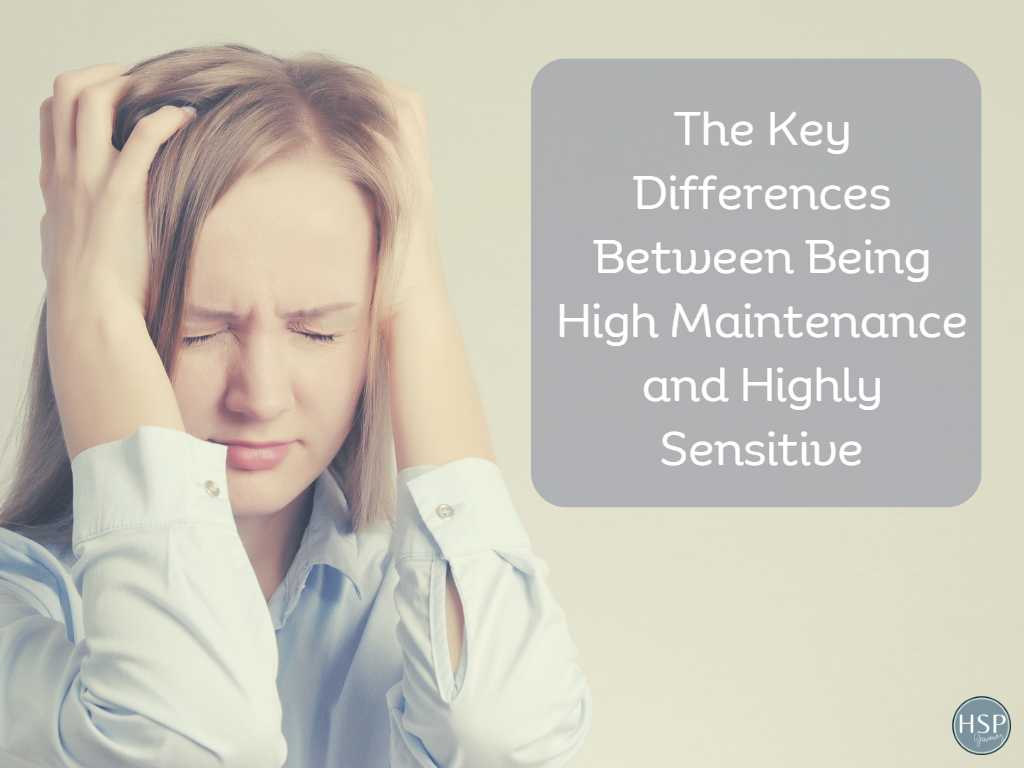Do you ever feel like you’re walking on eggshells around someone? Or that you can’t seem to do anything right? Maybe you’ve been accused of being “high maintenance” in a relationship or at work. But what if you’re not actually high maintenance, but instead, highly sensitive?
The terms “high maintenance” and “highly sensitive” are often used interchangeably, but they actually refer to two different things. A high maintenance person is someone who requires a lot of attention, time, and effort to maintain their happiness and well-being. On the other hand, a Highly Sensitive Person (HSP) is someone who is more aware of their surroundings, emotions, and other people’s feelings than the average person.
Understanding the difference between high maintenance and highly sensitive can have a significant impact on your relationships and work environments. It can help you identify your own needs and communicate them effectively to others. In this article, we’ll explore the key differences between high maintenance and highly sensitive people, how they impact relationships, and how to navigate work environments as an HSP.

Table of Contents
Key Takeaways
- High maintenance and highly sensitive are two different things.
- Understanding the difference can improve relationships and work environments.
- Navigating work environments as an HSP requires self-awareness and effective communication.
Key Differences Between High Maintenance and Highly Sensitive People
Definition of High Maintenance
High maintenance people are those who require a lot of attention, time, and resources from others. They often have a high sense of entitlement and demand a lot of things from others. They can be very demanding and difficult to please. High maintenance people often have a strong need for control and can become upset or angry when things don’t go their way.
Definition of a Highly Sensitive Person
Highly sensitive people, or HSPs, are those who have a heightened sensitivity to their environment and the emotions of others. They are often very empathetic and compassionate towards others. HSPs can become easily overwhelmed by stimuli such as loud noises, bright lights, and strong smells. They may also be more prone to anxiety and depression.
Traits of High Maintenance People
Some common traits of high maintenance people include:
- A strong sense of entitlement
- Demanding and difficult to please
- Need for control
- Easily upset or angry when things don’t go their way
- Can be self-centered and insensitive towards others
Traits of Highly Sensitive People
Some common traits of highly sensitive people include:
- Heightened sensitivity to their environment and the emotions of others
- Empathetic and compassionate toward others
- Easily overwhelmed by stimuli such as loud noises, bright lights, and strong smells
- More prone to anxiety and depression
- Can be introspective and reflective
How to Identify if You Are High Maintenance or Highly Sensitive
If you are unsure whether you are high maintenance or highly sensitive, here are a few questions to ask yourself:
- Do you often demand a lot of attention and resources from others?
- Do you become easily upset or angry when things don’t go your way?
- Are you sensitive to your environment and the emotions of others?
- Do you become easily overwhelmed by stimuli such as loud noises, bright lights, and strong smells?
- Are you introspective and reflective?
By answering these questions honestly, you can gain a better understanding of whether you are high maintenance or highly sensitive. It’s important to remember that neither trait is inherently good or bad and that everyone has their unique personality and strengths and weaknesses.
Impact on Relationships
Being in a relationship with a high maintenance or Highly Sensitive Person can be challenging, but it doesn’t mean that it’s impossible to have a happy and healthy relationship. In this section, we’ll explore the impact of high maintenance and HSPs on relationships, and provide tips on how to cope with them.
Looking for HSP Tools to Thrive in a Chaotic World?
The modern world is often overwhelming and stressful for those of us with sensitive nervous systems. Many of us have suffered from the challenges of high stress, anxiety, sensory overload, and mental health and physical health issues. Fortunately, after years of working with and researching Highly Sensitive People (HSPs), Julie Bjelland has developed many tools that have not only helped her but thousands of HSPs all over the world move out of survival mode living and into thriving. In this free webinar, she’ll share the tools that HSPs have found the most life-changing. Her goal is to help you live to your fullest potential because the world needs you.
Join this free webinar and get tools to help you thrive as an HSP!
High Maintenance People in Relationships
High maintenance people can be demanding and difficult to please. They have high expectations and require constant attention and validation. This can put a strain on a relationship, especially if their partner is not able to meet their needs. High maintenance people may also be prone to jealousy and possessiveness, which can lead to conflicts and arguments.
If you are in a relationship with a high maintenance person, it’s important to set boundaries and communicate your needs clearly. Let them know that you care about them, but also make it clear that you have your own life and priorities. It’s also important to avoid enabling their behavior by constantly giving in to their demands. Instead, encourage them to be more independent and self-reliant.
Highly Sensitive People in Relationships
Highly sensitive people are more aware of their surroundings and the people in it. They are more empathetic and emotional, which can be a positive trait in a relationship. However, their sensitivity can also make them more vulnerable to stress and anxiety, which can impact their relationships.
If you are in a relationship with a highly sensitive person, it’s essential to be patient and understanding. Don’t dismiss their feelings or tell them to “toughen up.” Instead, listen to them and validate their emotions. It’s also important to create a safe and supportive environment where they feel comfortable expressing themselves.
How to Cope with High Maintenance or Highly Sensitive Partners
If you are in a relationship with a high maintenance or highly sensitive person, there are several things you can do to cope with their behavior. Here are some tips:
- Communicate clearly: Let them know how you feel and what you need from the relationship.
- Set boundaries: Don’t let them take over your life or dictate your priorities.
- Be patient: High maintenance and highly sensitive people may need more time and attention than others.
- Show empathy: Try to understand their perspective and validate their emotions.
- Encourage independence: Help them become more self-reliant and less dependent on you.
Remember, every relationship is unique, and what works for one couple may not work for another. The key is to be open and honest with each other and to work together to find solutions that work for both of you.
Navigating Work Environments
High Maintenance Employees
Dealing with high maintenance employees can be challenging. They may require a lot of attention, constant feedback, and reassurance. They may also be demanding, difficult to please, and create unnecessary drama. As an employer, it’s important to set clear boundaries and expectations with high maintenance employees. Be firm but fair when communicating with them and avoid getting pulled into their drama.
Highly Sensitive Employees
Highly sensitive employees have a sensitive nervous system, so they absorb and process more information than average, and reflect on it more deeply. This trait is often mistaken for introversion and emotionality, but a study by Dr. Elain Aron showed it to be unrelated. If you have highly sensitive employees, it’s important to understand their needs and work with them to create a comfortable work environment.
HSPs may need more quiet time, breaks, and may be more affected by loud noises, bright lights, and strong smells. They may also be more affected by criticism and negative feedback, so it’s important to provide constructive feedback in a supportive manner.
How Employers Can Support High Maintenance or Highly Sensitive Employees
As an employer, it’s important to create a supportive work environment that meets the needs of all employees, including high maintenance and highly sensitive employees. Here are a few ways to support them:
- Provide clear expectations and boundaries
- Offer regular feedback and support
- Allow for quiet time and breaks
- Avoid loud noises, bright lights, and strong smells
- Provide constructive feedback in a supportive manner
- Offer training and development opportunities
By creating a supportive work environment, you can help high maintenance and highly sensitive employees thrive and contribute to the success of your business.
Be sensitive, be free
*This post contains affiliate links and I will be compensated if you make a purchase after clicking on my links*





[…] I have always had to regulate environmental stimuli in a variety of ways in order to navigate overwhelm and overstimulation that I experience. Below, I’ll take a stab at offering you insightful ways […]